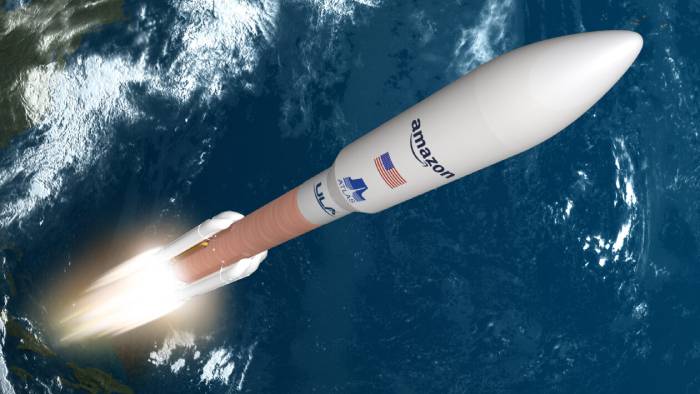Amazon stated on Tuesday that it has signed a deal with three companies for up to 83 launches of its Project Kuiper broadband satellites, which it claims is the largest rocket deal in the commercial space industry’s history.
The tech giant signed contracts for 38 launches with United Launch Alliance (ULA), a Boeing-Lockheed Martin joint venture; 18 launches with Arianespace, a European company; and 12 launches with Blue Origin, a private venture owned by Amazon founder Jeff Bezos, with an option for up to 15 more launches.
Amazon’s Project Kuiper is a plan to launch a network of 3,236 satellites into low-Earth orbit to provide high-speed internet to everybody, anywhere. The FCC approved Amazon’s system in 2020, and the corporation has stated that it will “invest more than $10 billion” in its construction.
Amazon plans to launch a pair of Kuiper prototype satellites later this year, using ABL Space’s RS1 rocket, before moving on to operational satellites. Despite the fact that Amazon has not stated when the Kuiper launch campaign will begin, FCC rules force the corporation to launch half of its planned satellites within six years, implying that around 1,600 will be in orbit by July 2026.
“We still have lots of work ahead, but the team has continued to hit milestone after milestone across every aspect of our satellite system. These launch agreements reflect our incredible commitment and belief in Project Kuiper.” In a statement, Amazon senior vice president of devices and services Dave Limp said.
The contract terms, which were revealed on Tuesday, were not disclosed.
The 18 Kuiper missions will be launched by Arianespace on its upcoming Ariane 6 rockets, which are planned to launch later this year. The European rocket manufacturer has also not revealed Ariane 6’s price structure, but it has previously stated that a base price of $77 million per launch is its goal.
The 12 Kuiper missions that Blue Origin will host will be launched using its New Glenn rockets. While Blue Origin has yet to announce an official launch date for New Glenn, CNBC previously speculated that the rocket would launch in 2024 or later. The cost of New Glenn launches has not been officially disclosed, although an Arianespace estimate from two years ago put the Blue Origin rocket at $68 million per launch. Blue Origin is a different company from Amazon, despite the fact that both were founded by Jeff Bezos.
Amazon’s Kuiper launch contracts are worth billions of dollars in total, though it’s unclear how competitive bidding and any bulk order discounts may affect overall pricing. The cost was not mentioned by any of the four companies.
Defeating SpaceX
The most active U.S. rocket business, Elon Musk’s SpaceX, is noticeably absent from Amazon’s launch payroll. Despite Musk’s promise to launch competitors, Amazon and SpaceX have been at odds with federal regulators for years over their rival satellite internet networks, Kuiper and Starlink.
SpaceX has a significant lead over Amazon in the battle to provide internet from space, having launched over 2,000 Starlink satellites to date, servicing approximately 250,000 subscribers.
However, Amazon is banking on its global reach to bridge the gap. Kuiper will “will leverage Amazon’s global logistics and operations footprint, as well as Amazon Web Services’ (AWS) networking and infrastructure,” according to the business.
Amazon also has a leg up on the competition when it comes to addressing one of the biggest roadblocks to affordable satellite internet: the antennae that customers need to connect. To make the service “accessible,” Amazon has claimed its “experience producing low-cost devices and services like Echo and Kindle.”
Amazon hasn’t revealed anything about the Kuiper satellites, such as their mass or power, and it hasn’t said how many will launch on each rocket. However, Amazon said that it is partnering with Swiss business Beyond Gravity to create satellite dispensers to deploy the Kuiper spacecraft, indicating that the company’s design is nearing completion, if not already completed.
- March Madness 2025: Printable Bracket, Game Schedule & How to Watch - March 13, 2025
- March Madness Miracles: Worst Records to Get an NCAA Tournament Bid - March 13, 2025
- NCAA DI Wrestling Championships 2025: How to Watch, Brackets & Selection Info - March 13, 2025



